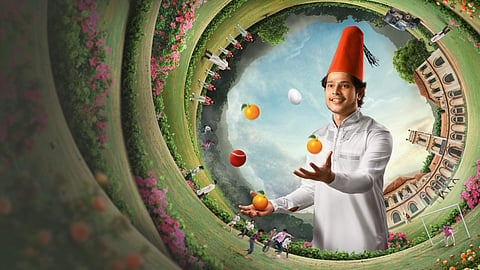Daredevil Musthafa Movie Review: Bridging religious divides through friendship and cricket
Rating:(3.5 / 5)
Debutant Shashank Soghal’s Daredevil Musthafa is a remarkable achievement in Kannada cinema, considering the scarcity of book-to-screen adaptations in recent years. It is an impressive execution of Poornachandra Tejaswi’s timeless short story of the same name, written in the 1970s, what motivatesShashank to take on an unconventional path. He has tried to bring to life one of the beloved tales that is close to the picturesque writing of Tejaswi. He takes us back to college life, introduces a game, and underlines themes of communal harmony. The film begins with an intriguing excerpt from one of Poornachandra Tejaswi’s thought-provoking interviews, where he passionately expresses his disapproval of young individuals involved in communal violence.
Director: Shashank Sohgal
Cast: Shishir Baikady, Aditya Ashree, Prerana Gowda, Mandya Ramesh, Harini, Nagabhushana, and Poornachandra Mysore
The film is set in the fictional town of Abachuru, a quaint town that serves as the backdrop of the tale. A place, with a peculiar history of its own delves into the deep-rooted perceptions surrounding Muslims. Despite its pleasant appearance, the town wrestles with communal animosity between Hindus and other religions. The tension reaches its peak during the yearly Ganapati festival, particularly when the procession passes by the Muslim dargah. The situation has further deteriorated following the eloping of a Hindu girl with a Muslim boy. Against this backdrop, the story unfolds, around the Abachurina Government Pre-University college.
Ramanuja Iyengari (Aditya Ashree) is happy to be joining his friends in the same college, and his face brightens up to know that Ramamani (Prerna Gowda ) has also joined the same batch. Everything seems fine and rosy until the entry of Jamal Abdul Musthafa Hussain (Shishir Baikady), 20 days after the college reopening, and he happens to be the sole Muslim student in the entire college. The limited knowledge among the students fosters stereotypical notions about Muslims, and Musthafa becomes the focal point for gossip. They ponder whether he hails from the esteemed Tipu Sultan family, whether he possesses the extraordinary ability to fix punctures without water or whether he immerses himself in fragrant perfumes.
As the story unfolds, Ramanuja Iyengari and his boys progressively seethe their anger. Moreover, Musthafa, resenting his captivating allure over both girls and teachers further adds fuel to the fire. These differences among students quickly lead to conflicts, prompting Ramanuja Iyengari and his gang to devise schemes aimed at getting Musthafa expelled from college. Will their triumph in their endeavours, or is there more to this rivalry than what meets the eye?
Shashank Sohgal is from the theatre, and so is his cast, even though it is their first silver-screen outing the director and the gang shine. The director recreates the timeless vintage era, and takes creative liberty incorporating hilarious wordplay that grows even more amusing throughout the narrative.
In an attempt to cater to mainstream cinema, there are a couple of songs amidst a fight sequence and advocating harmony leaves an impact. Shashank skillfully handles the teenage actors, avoiding exaggerated innocence or overly dramatic emotions for more authentic portrayals, and their theatre background has come in handy. The lead actors, including Shishir Baikady as Musthafa, Aditya Ashree as Ramanuja, Prerana Gowda as Ramamani, Abhay, Supreeth Bharadwaj, Aashith, Srivatsa, Shobharaj Pavoor, and many others, contribute to making this film truly memorable, and the former two characters truly stand out. Among the many students, meticulous character development is evident, such as Musthafa’s repeated assertion of being a ‘Daredevil’, which effectively portrays his confidence and fearlessness. The film also showcases reliable performances from senior actors like Mandya Ramesh, and Nagabhushana, who makes sure the humour remains intact and supporting actors MS Umesh, and Poornachandra Mysore leave a mark. Daredevil Musthafa, which pays a commendable tribute to Dr Rajkumar, with the animated song seamlessly integrated without disrupting the film’s flow, but the best part of the film, is the cricket match. Divided by religion they are united by cricket. The game that can change at any moment helps them surpass their religious barriers. Tejaswi had constructed this part well in his imaginative world and it is brought to life beautifully by the director.
However, Tejaswi, who had highlighted the religious differences in society, had given an open end to his story, and that’s where the film director diverges from the original story in the final act, which is extended and delayed. Though the director gets carried away with the film’s duration he ends it with a heartwarming message.
Unlike most films, which show a particular religion on the wrong side, it is refreshing to witness both Hindu and Muslim boys as heroes on screens. The film’s relevant message resonates with contemporary times, and fortunately, it comes packaged with entertainment.
Daredevil Musthafa promotes communal harmony is a treat to watch, and it is filled with the fun atmosphere of college life, friendship and love, which are above our differences, and it is a great take away even now.

